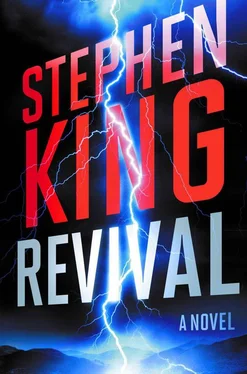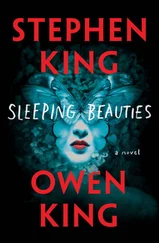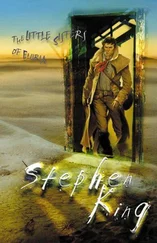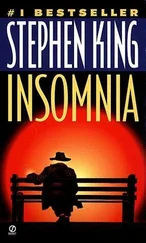“Shut that shit off,” he said.
Ronnie did so—that week’s hoot was almost over, anyway. “I didn’t know you played, Grampa,” he said.
“Ain’t in years,” Hector said. “Put it away when the arthritis started to bite. I don’t know if I can even tune the bitch anymore.”
“Language, Dad,” Mrs. Paquette called from the kitchen.
Hector the Barber paid no attention to her; unless he needed her to pass the mashed potatoes, he rarely did. He tuned the guitar slowly, muttering curses under his breath, then played a chord that actually sounded a bit like music. “You could tell it was still off,” Con said when he told me the story later, “but it was pretty cool, anyway.”
“Wow!” Ronnie said. “Which chord is that, Grampa?”
“E. All this shit starts with E. But wait, you ain’t heard nothing yet. Lemme see if I can remember how this whoremaster goes.”
From the kitchen: “Language, Dad.”
He paid no more mind this time, only began to strum the old guitar, using one horny, nicotine-yellowed fingernail as a pick. He was slow at first, muttering more unapproved language under his breath, but then he picked up a steady, chugging rhythm that made the boys glance at each other in amazement. His fingers slid up and down the fretboard, clumsily at first, then—as the old memory synapses guttered back to life—a little more smoothly: B to A to G and back home to E. It’s a progression I’ve played a hundred thousand times, although in 1963 I wouldn’t have known an E chord from a spinal cord.
In a high, wailing voice utterly unlike the one he spoke in (when he did speak), Ronnie’s grandpa sang: “Why don’t you drop down, darlin, let your daddy see… you got somethin, darlin, keep on worryin me…”
Mrs. Paquette came in from the kitchen, drying her hands on a dishtowel and looking as if she’d seen some exotic bird—an ostrich or an emu, say—strutting down the middle of Route 9. Billy and little Rhonda Paquette, who could have been no more than five, came halfway down the stairs, leaning over the railing and goggling at the old man.
“That beat ,” Con told me later. “It sure wasn’t like anything they play on Hootenanny .”
Hector the Barber was now thumping his foot in time and grinning. Con said he’d never seen the old man grin before, and it was a little scary, like he’d turned into some kind of singing vampire.
“My mama don’t allow me to fool around all night long… she afraid some woman might… might…” He drew it out. “ Miiight not treat me right!”
“Go, Grampa!” Ronnie shouted, laughing and clapping his hands.
Hector launched into the second verse, the one about how the jack of diamonds told the queen of spades to go on and start her creepin ways, but then a string broke: TWANNG.
“Oh, you dirty cunt,” he said, and that was it for Hector the Barber’s impromptu concert. Mrs. Paquette snatched away his guitar (the broken string flying dangerously close to her eye) and told him to go on outside and sit on the porch if he was going to talk that way.
Hector the Barber did not go out on the porch, but he did lapse back into his accustomed silence. The boys never heard him sing and play again. He died the following summer, and Charles Jacobs—still going strong in 1964, the Year of the Beatles—officiated at his funeral.
• • •
The day after that abbreviated versionof Arthur “Big Boy” Crudup’s “My Mama Don’t Allow Me,” Ronnie Paquette found the guitar in one of the swill barrels out back, deposited there by his outraged mom. Ronnie took it to school, where Mrs. Calhoun, the English teacher who doubled as the middle school music teacher, showed him how to put on a new string, and how to tune it by humming the first three notes of “Taps.” She also gave Ronnie a copy of Sing Out! , a folk music magazine that had both lyrics and chord changes to songs like “Barb’ry Allen.”
During the next couple of years (with a brief hiatus during the time when the Ski Pole of Destiny rendered Connie mute), the two boys learned folk song after folk song, trading the old guitar back and forth as they learned the same basic chords Leadbelly no doubt strummed during his prison years. Neither of them could play worth a tin shit, but Con had a pretty good voice—although too sweet to be convincing on the blues tunes he loved—and they performed in public a few times, as Con and Ron. (They flipped a coin to see whose name would come first.)
Con eventually got his own guitar, a Gibson acoustic with the cherry finish. It was a hell of a lot nicer than Hector the Barber’s old Silvertone, and it was the one they used when they sang stuff like “Seventh Son” and “Sugarland” at the Eureka Grange on Talent Night. Our dad and mom were encouraging, and so were Ronnie’s folks, but GIGO holds true for guitars as well as computers: garbage in, garbage out.
I paid little attention to Con and Ron’s attempts to attain local stardom as a folk duo, and hardly noticed when my brother’s interest in his Gibson guitar began to wither away. After Reverend Jacobs drove his new-old car out of Harlow, it felt to me as if there was a hole in my life. I had lost both God and my only grownup friend, and for a long time after I felt sad and vaguely frightened. Mom tried to cheer me up; so did Claire. Even my dad had a go. I tried to get happy again, and eventually succeeded, but as 1965 gave way to 1966 and then 1967, the cessation of badly rendered tunes like “Don’t Think Twice” from upstairs wasn’t even on my radar.
By then Con was all about high school athletics (he was a hell of a lot better at those than he ever was at playing the guitar), and as for me… a new girl had moved into town, Astrid Soderberg. She had silky blond hair, cornflower-blue eyes, and little sweater-nubbins that might in the future become actual breasts. During the first years we were in school together, I don’t think I ever crossed her mind—unless she wanted to copy my homework, that was. I, on the other hand, thought of her constantly. I had an idea that if she allowed me to touch her hair, I might have a heart attack. One day I got the Webster’s dictionary from the reference shelf, took it back to my desk, and carefully printed ASTRID across the definition of kiss , with my heart thumping and my skin prickling. Crush is a good word for that sort of infatuation, because crushed is how I felt.
Picking up Con’s Gibson never occurred to me; if I wanted music I turned on the radio. But talent is a spooky thing, and has a way of announcing itself quietly but firmly when the right time comes. Like certain addictive drugs, it comes as a friend long before you realize it’s a tyrant. I found that out for myself the year I turned thirteen.
First this, then that, hence the other thing.
• • •
My musical talent was far from huge,but much larger than Con’s… or anyone else’s in our family, for that matter. I discovered it was there on a boring, overcast Saturday in the fall of 1969. Everyone else in the family—even Claire, who was home from college for the weekend—had gone over to Gates Falls for the football game. Con was then a junior and a starting tailback for the Gates Falls Gators. I stayed home because I had a stomachache, although it wasn’t as bad as I made out; I just wasn’t much of a football fan, and besides, it looked like it was going to rain.
I watched TV for awhile, but there was more football on two channels, and golf on the third—even worse. Claire’s old bedroom was now Connie’s, but some of her paperbacks were still stacked in the closet, and I thought I might try one of the Agatha Christies. Claire said they were easy to read, and it was fun to detect along with Miss Marple or Hercule Poirot. I walked in and saw Con’s Gibson in the corner, surrounded by an untidy heap of old Sing Out! magazines. I looked at it, leaning there and long forgotten, and thought, I wonder if I could play “Cherry, Cherry” on that .
Читать дальше












